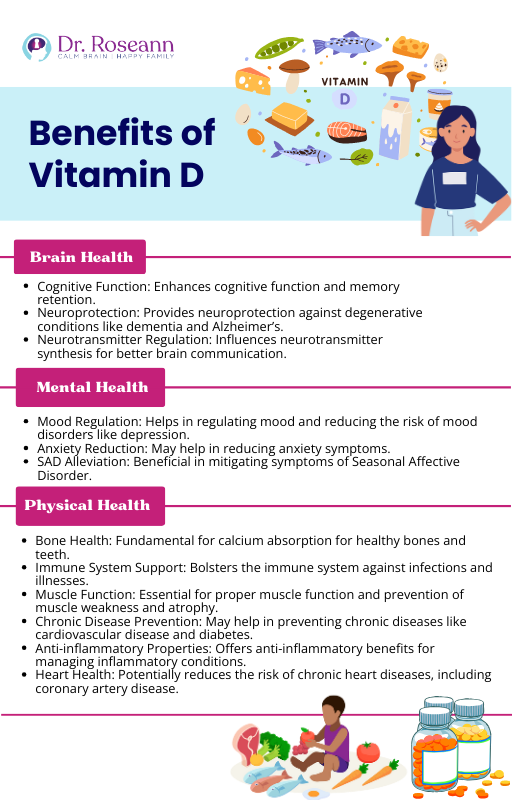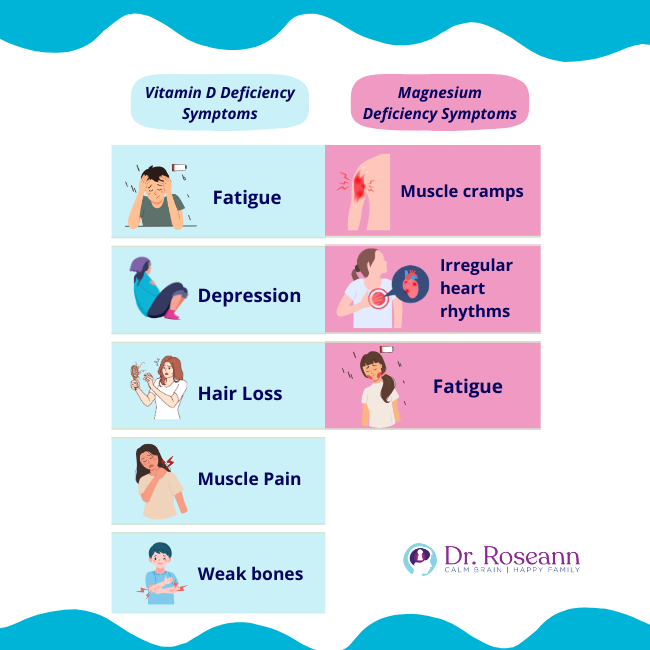It is now the moment to uncover the powerful pair that could become the closest friends of your child's brain – Magnesium and Vitamin D. If you have been navigating the unpredictable journey of raising children or teenagers who are dealing with mental health and behavioral difficulties, such as ADHD, autism, OCD, anxiety, mood disorders, PANS, or PANDAS, you are aware that even the most minor changes can have a significant impact.
Let’s explore the remarkable advantages of these two vital nutrients, both when they are separate and when they work together.
The Importance of Magnesium and Vitamin D
Before diving into the dynamic duo that is Vitamin D and Magnesium, it's pivotal to grasp why these nutrients are indispensable to our well-being. These aren't just any random vitamins and minerals; they're the underpinning of our body's ability to function optimally.
Vitamin D, often termed the “sunshine vitamin”, is crucial for a multitude of physiological processes. It plays a quintessential role in calcium absorption in the gut, which is essential for maintaining healthy bones and teeth. Additionally, Vitamin D is a key player in immune system regulation, helping your body to fend off invaders like viruses and bacteria. The importance of Vitamin D extends to mood regulation too, with deficiencies linked to conditions like Seasonal Affective Disorder (SAD) and depression.
On the other side, we have Magnesium, a mineral that's instrumental in over 300 enzymatic reactions within the body. From energy production and muscle and nerve function to blood glucose control and bone integrity, magnesium is indeed a multi-faceted mineral. It also has a calming effect on the nervous system, which can be particularly beneficial in managing stress and sleep disorders.
The fact that these nutrients play such extensive and varied roles in our body's functioning underscores their importance. They're not just beneficial; they're fundamental.
Taking Magnesium and Vitamin D Together
The camaraderie between Magnesium and Vitamin D is something akin to a well-oiled machine, each enhancing the other's functionality, creating a synergy that's hard to rival. Imagine a buddy cop movie where our two heroes join forces to combat the villains of poor health and disease, that's the kind of potent alliance we're talking about.
When taken together, these nutrients amplify each other's benefits. Magnesium aids in the metabolism and utilization of Vitamin D, ensuring it gets absorbed properly and fully activated in the body. Conversely, Vitamin D helps in the absorption of magnesium, making it a two-way beneficial street. This partnership is particularly vital for bone health, as both nutrients work in tandem to enhance calcium absorption and promote bone density.
Moreover, the combined intake can also foster a conducive environment for brain health. Magnesium's calming effects coupled with Vitamin D's mood-enhancing properties can be a solid foundation for promoting mental well-being, reducing anxiety, and possibly alleviating symptoms of depression.
In the realm of supporting immune function, this duo again shines. They both have individual merits in immune regulation, but together, they can provide a more robust defense against infections and diseases.
Lastly, when it comes to children, ensuring a balanced intake of Magnesium and Vitamin D can pave the way for a healthier and more harmonious growth trajectory, both mentally and physically. By fostering a conducive internal environment, these nutrients contribute to a child's cognitive development, emotional stability, and overall vigor.
What is Benefits of Vitamin D?
People often hail vitamin D as the “sunshine vitamin” because your skin produces it when exposed to sunlight. But in our busy lives, we often miss out on this natural source. That's where supplementation comes in, and boy, does it do wonders for your child's mental health.
There are many health benefits for the brain, mental health and physical health.
Recent research delved into the connection between vitamin D and mood (Reddy and Edwards 2019). They discovered an association between vitamin D deficiency and depressive symptoms. So, by ensuring your child gets their daily dose of vitamin D, you're potentially giving them a sunnier disposition. Who doesn't want that?
Why Does Your Brain and Body Need Magnesium?
Now, let's discuss Magnesium. It's like nature's calmer for the brain. If your child's mind is a whirlwind of thoughts and emotions, Magnesium might be the solution.
Along with many other physical and brain benefits of magnesium, taking magnesium supplements can enhance mood and alleviate symptoms of depression (Abiri et al., 2022). If you're a parent walking on eggshells trying to maintain a peaceful home, this might be music to your ears.
But the magic of Magnesium doesn't end there. It's also a key player in energy production and reducing inflammation. This can be a game-changer for conditions like PANS and PANDAS.
Vitamin D3 and Magnesium: What Does it Do for Your Brain and Body
So, what happens when these two join forces?
Research shows that magnesium is essential for vitamin D to work properly in your body (Uwitonze and Razzaque 2018). Without it, your vitamin D might not be doing its full job.
When your child takes magnesium and vitamin D together every day, it can be very beneficial for their health. They could be happier, calmer, and more focused. Now, that's a winning team!
Vitamin D Magnesium Absorption
But it's not just about what you eat or take; it's also about how your body absorbs these nutrients. Vitamin D is critical for calcium absorption, which affects muscle function and nerve communication. Magnesium activates vitamin D in your child's body. It works like a well-coordinated dance, ensuring smooth communication between their brain and nerves.
Vitamin D and Magnesium Deficiency Symptoms
What happens if your child has a magnesium and vitamin D deficiency? Let's take a quick look at the symptoms:
-
- Vitamin D Deficiency Symptoms: Fatigue, depression, hair loss, muscle pain, and weak bones.
-
- Magnesium Deficiency Symptoms: Muscle cramps, irregular heart rhythms, and fatigue.

Recognizing low magnesium and vitamin D levels is important for improving your child's health.
Positive Effects of Vitamin D: The Research on Vitamin D
Recent research has shown some positive effects of vitamin D on mental health. As mentioned earlier, researchers have linked vitamin D deficiency to depressive symptoms. But the benefits of Vitamin D continue beyond there.
Vitamin D, often overlooked, is a powerhouse nutrient that offers a range of positive effects. It is important to get enough vitamin D for good health. You can do this through sunlight, food, or supplements.
Here are some of the benefits of Vitamin D
-
- Immune Function: Vitamin D is known to support the immune system. It enhances the innate immune response, helping the body fight infections and illnesses. Several studies suggest a link between adequate vitamin D levels and a reduced risk of respiratory infections and autoimmune diseases (Aranow, 2011).
-
- Bone Health: Vitamin D's classic role in maintaining bone health by promoting calcium absorption in the intestines. Sufficient vitamin D is essential to prevent conditions like osteoporosis and rickets (Holick, 2007).
-
- Mental Well-Being: Emerging research indicates that vitamin D may be associated with improved mood and cognitive function. Low vitamin D levels have been linked to conditions like depression and seasonal affective disorder (Anglin et al., 2013).
-
- Chronic Disease Prevention: Studies have identified vitamin D's potential in preventing chronic diseases. Research suggests it may play a role in reducing the risk of cardiovascular diseases, diabetes, cancers, autoimmune diseases, infectious diseases, and musculoskeletal disorders (Holick, 2007; Aranow, 2011).Support for Muscles and Brain Health: Vitamin D's positive effects are not limited to bones. It is essential for muscle health and can potentially impede age-related cognitive decline (Annweiler et al., 2009).
Immune Dysregulation and The Importance of Magnesium Vitamin D
Kids with conditions like PANS, PANDAS, Lyme Disease, and more may have reduced symptoms when taking vitamin D and magnesium supplements. These nutrients. can have a positive effect on their wellbeing by supporting the nervous system. By controlling inflammation and bolstering the immune system, Vitamin D and magnesium might be able to mitigate behavioral problems.
Magnesium and Vitamin D Supplement For Mental Health
In recent years, magnesium and vitamin D supplements have gained recognition for their potential to support mental health (Abiri et al., 2022). These nutrients play significant roles in promoting overall well-being, with a particular focus on mental health.
Magnesium is an essential mineral for our bodies, acting as a calming booster for our minds. When we're low on magnesium, it can result in feelings of sadness or anxiety (Abiri et al., 2022). On the other hand, Vitamin D acts as a mood manager, and insufficient levels can lead to feelings of sadness and even conditions like depression (Abiri et al., 2022). Together, these nutrients act as supportive allies for our mental and emotional health.
Can I Take Vitamin D and Magnesium with Other Minerals and Vitamins?
The short answer is yes, you can combine vitamin D and magnesium with other vitamins and minerals, but it's essential to maintain a balanced approach. While a nutrient-rich diet is important, it's not always possible to get all the necessary nutrients from food alone.
To ensure your child receives the right balance of nutrients, consult with a healthcare provider who can offer personalized guidance.
Natural Solutions: A Ray of Hope
Raising kids with behavior and mental health issues is tough, but it can be very fulfilling. The journey may be challenging, but you can significantly impact your child's life with the right tools and knowledge.
The combination of magnesium and vitamin D might be that ray of hope you've been searching for. The science is precise, and the potential benefits are too significant to ignore. Always talk to a doctor before significantly changing your child's diet or giving them new dietary supplements.
So, here's to brighter days, calmer minds, and happier hearts. The dynamic duo of magnesium and vitamin D might just be the superheroes your family needs.Vitamin D and magnesium are essential nutrients that play crucial roles in maintaining overall health, brain function, bone health, and immune system support. Eating well or taking supplements with these nutrients can make you healthier and improve your overall well-being. By understanding the importance of vitamin D and magnesium and taking action to maintain adequate levels, individuals can experience the numerous benefits these nutrients offer.
Parent Action Steps for Nutritional Support
☐ Consult a Healthcare Professional: Talk to a children's health expert for guidance.
☐ Dietary Assessment: Get help from a nutritionist to make healthy eating fun.
☐ Magnesium-Rich Foods: Enjoy tasty snacks with nuts, seeds, greens, and dark chocolate.
☐ Fatty Fish for Vitamin D: Introduce fish like salmon for a vitamin D boost.
☐ Sunlight Exposure: Spend time outdoors but protect from the sun.
☐ Join a support network with other parents who have children with similar conditions
☐ Supplement Consistency: Make taking dietary supplements part of your daily routine like
☐ Neurotastic™ Multi-Mag Brain™ Formula for extra magnesium.
☐ Magnesium Supplements: Consider adding Balanced Diet: Create colorful, nutrient-rich meals. Explore and savor natural foods together.
Citations:
Abiri, B., Sarbakhsh, P., & Vafa, M. (2022). Randomized study of the effects of vitamin D and/or magnesium supplementation on mood, serum levels of BDNF, inflammation, and SIRT1 in obese women with mild to moderate depressive symptoms. Nutritional neuroscience, 25(10), 2123–2135. https://doi.org/10.1080/1028415X.2021.1945859
Anglin RE, Samaan Z, Walter SD, McDonald SD. Vitamin D deficiency and depression in adults: systematic review and meta-analysis. Br J Psychiatry. 2013 Feb;202:100-7. PMID: 23377209. https://doi.org/10.1192/bjp.bp.111.106666
Annweiler C, Schott AM, Allali G, Bridenbaugh SA, Kressig RW, Allain P, Herrmann FR, Beauchet O. Association of vitamin D deficiency with cognitive impairment in older women: cross-sectional study. Neurology. 2010 Jan 5;74(1):27-32. Epub 2009 Sep 30. PMID: 19794127. https://doi.org/10.1212/WNL.0b013e3181beecd3
Aranow C. Vitamin D and the immune system. J Investig Med. 2011 Aug;59(6):881-6. https://doi.org/10.2310/JIM.0b013e31821b8755 PMID: 21527855; PMCID: PMC3166406.
Reddy, P., & Edwards, L. R. (2019). Magnesium Supplementation in Vitamin D Deficiency. American journal of therapeutics, 26(1), e124–e132. https://doi.org/10.1097/MJT.0000000000000538
Serefko A, Szopa A, Wlaź P, Nowak G, Radziwoń-Zaleska M, Skalski M, Poleszak E. Magnesium in depression. Pharmacol Rep. 2013;65(3):547-54. doi: https://doi.org/10.1016/s1734-1140(13)71032-6 .PMID: 23950577.
Uwitonze, A. M., & Razzaque, M. S. (2018). Role of Magnesium in Vitamin D Activation and Function. The Journal of the American Osteopathic Association, 118(3), 181–189. https://doi.org/10.7556/jaoa.2018.037
Always remember… “Calm Brain, Happy Family™”
Disclaimer: This article is not intended to give health advice and it is recommended to consult with a physician before beginning any new wellness regime. *The effectiveness of diagnosis and treatment vary by patient and condition. Dr. Roseann Capanna-Hodge, LLC does not guarantee certain results.
Are you looking for SOLUTIONS for your struggling child or teen?
Dr. Roseann and her team are all about science-backed solutions, so you are in the right place!
Empower yourself with natural solutions for your child's mental health and behavior. Download our FREE quick start guide and start supporting your child today.
You can get her books for parents and professionals, including: It’s Gonna Be OK™: Proven Ways to Improve Your Child’s Mental Health, Teletherapy Toolkit™ and Brain Under Attack: A Resource For Parents and Caregivers of Children With PANS, PANDAS, and Autoimmune Encephalopathy.
If you are a business or organization that needs proactive guidance to support employee mental health or an organization looking for a brand representative, check out Dr. Roseann’s professional speaking page to see how we can work together.
Dr. Roseann is a Children’s Mental Health Expert and Therapist who has been featured in/on hundreds of media outlets including, CBS, NBC, FOX News, PIX11 NYC, The New York Times, The Washington Post, Business Insider, USA Today, CNET, Marth Stewart, and PARENTS. FORBES called her, “A thought leader in children’s mental health.”

She is the founder and director of The Global Institute of Children’s Mental Health and Dr. Roseann Capanna-Hodge, LLC. Dr. Roseann is a Board Certified Neurofeedback (BCN) Practitioner, a Board Member of the Northeast Region Biofeedback Society (NRBS), Certified Integrative Mental Health Professional (CIMHP) and an Amen Clinic Certified Brain Health Coach. She is also a member of The International Lyme Disease and Associated Disease Society (ILADS), The American Psychological Association (APA), Anxiety and Depression Association of America (ADAA) National Association of School Psychologists (NASP), International OCD Foundation (IOCDF) International Society for Neurofeedback and Research (ISNR) and The Association of Applied Psychophysiology and Biofeedback (AAPB).
© Roseann-Capanna-Hodge, LLC 2023











